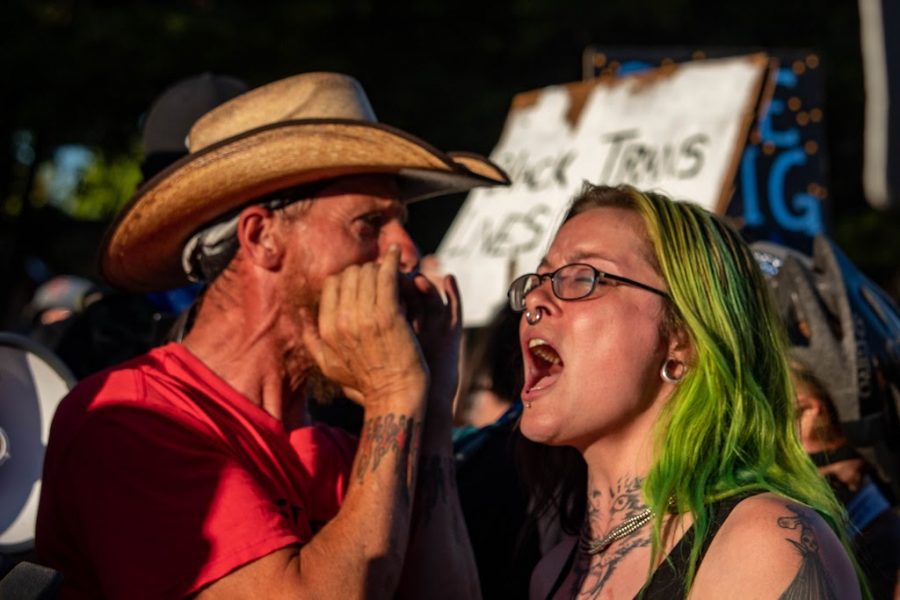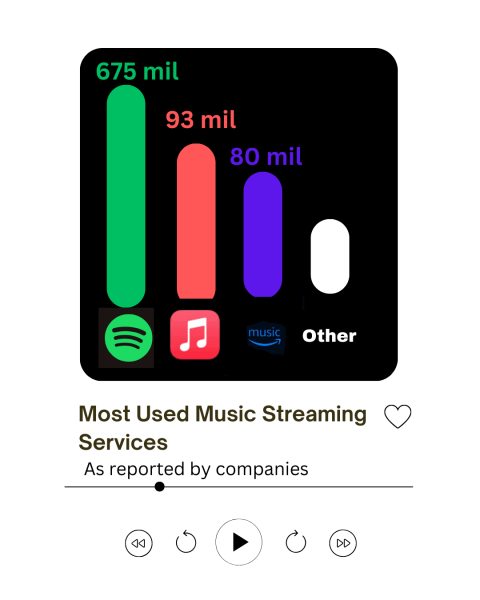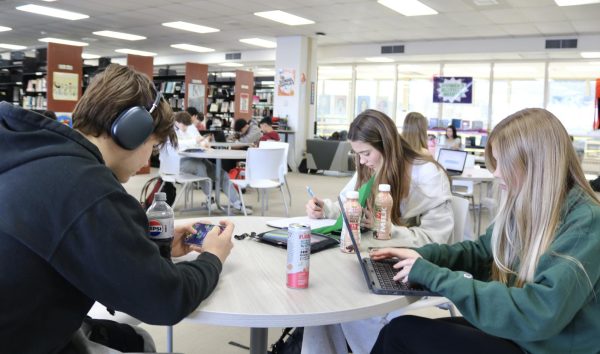We the people of the United States…can no longer talk to each other
Photo by David Geitgey Sierralupe on Flickr (CC BY 2.0)
High tension and arguments filled the streets of Springfield as ACAB advocates met Blue Lives Matter supporters.
Every moment of the first presidential debate was filled with constant interruptions, name calling and personal attacks between President Donald Trump and former Vice President Joe Biden, the two men from which we have the pleasure to choose between to be the president of the United States. Neither of them could finish any sentence of substance, which left American citizens and many around the world with unanswered questions and feelings of disappointment.
The debate was branded a “disgrace” by governors, fact-check panelists and many Americans, including myself, as we were left baffled by the immaturity of our nation’s leaders. Yet no matter how disillusioned the debate made us, it is important to realize that it was not that far off from how the rest of us often talk to each other.
COVID-19 isn’t the only pandemic we are living through- America is plagued by a crisis of polarization and hatred. Widespread disagreement has turned into an “us against them” mentality, with the biggest problem being communication; simply put, we can’t talk to one another.
In 2018 Florida Senator Marco Rubio said, “we are a nation of people that no longer speak to each other. We are a nation of people that have isolated ourselves politically and to a point where [open] discussions have become very difficult,” and this has only gotten worse.
This crisis doesn’t just remain in the realm of political discussions. It is a hatred that has fueled the end of relationships and blatant dehumanization of others just because they have different beliefs. We often disregard the First Amendment right of others and try to strip opposing views of their right to be heard.
Furthermore, people don’t just hate opposing ideas. They tend to hate the opposing person as a whole. We often generalize and assume an entire complex personality based on a single viewpoint. “Polarization is not just about ideological or policy disagreement. It’s rooted in social identity and emotion,” said political scientist William Howell, and we use this to create our tribes.
These are not just groups of opinion but of entire identities, demanding fierce loyalty and defining weakness as being able to understand or, God forbid, agree with a different tribe. This toxic sense of tribalism has created a war of implicit bias and stereotypes. I am in no way saying that everyone acts in an extreme way and that we are all evil people or that we should stop sharing our opinions. It is just that in this political climate, it is so easy to get caught up in the hive mindset of our tribes that we forget our central goal of creating solutions.
If you think about it, civil discourse is what makes our world progress. It takes people with differing ideas to question whether things could be done better or to ensure checks on power. If everyone agreed, the world would be static and there would be no reason to learn and grow.
But division is only constructive if it is civil. As Chancellor Gene Block of UCLA said in a letter to students and staff, “it is possible to express strong opinions without belittling others.” Expressing differing opinions is extremely important and while uncomfortable and often avoided, real and mature conversations can help us find effective solutions and make stronger connections.
The Charles Koch Institute defines civil discourse as a “conversation that looks to find shared opportunity, not conflict […] to remove barriers, not build new ones […] [and that] instead of becoming paralyzed by our disagreements, uses them to propel creative solutions and alternatives.”
Surrounding yourself with people who only share your views limits your vision of the world and how it works. Listening to other opinions can give you a new perspective on a situation, or at least make you more sympathetic and understanding of where the viewpoint is coming from.
That is one of the most important parts. Conversation often makes people and their views seem more human and realistic. Once we re-humanize a group that once fueled hatred, we can start to reach compromises and solutions on big issues.
For example, in a social justice movement such as Black Lives Matter, if opposing sides had open and honest discussions, we could more efficiently create solutions and implement positive change in our world.
As a teenager watching the death of civil discourse amongst adults and leaders, I feel a responsibility to learn how to revive it and help my generation lead the way on healthy debate. Learning how to speak and debate civilly can make a huge impact on the world and how we view it.
Here are a few tips for the next time you converse with someone you disagree with, inspired by Celeste Headlee’s TED article, “How to talk about politics constructively”:
- Listen: Give everyone a chance to talk and explain their point of view.
- Ask questions: Asking someone to clarify or answer why they believe what they do can help you understand their perspective.
- Avoid an accusatory tone or name calling: When discussing important topics, if you start to act disrespectfully, the other person will almost automatically stop listening to what you have to say and the conversation could enter dangerous waters.
- Don’t prejudge: Keep an open mind. Try to not make generalizations or associate stereotypes, and have empathy for why they believe what they do.
- Try to find a common ground: Even if you are on the opposite side of the political spectrum, that doesn’t mean you disagree on everything. Discussing similarities, not just divisions, can help you realize connections and common goals in which you can find mutual respect.
If you take away one thing from this article, please remember this: everybody deserves respect, and I mean everybody. No matter how much you disagree with someone, how outlandish their ideas may seem, or how bad of a person you may think they are, they do not deserve to be completely invalidated or to be yelled at.
No one has the same life experiences that mold them to believe and act the way they do and because of that, we need to rise above and act with empathy and love. In acting respectfully towards others, we are, in turn, respecting ourselves.












Chris • Oct 19, 2020 at 9:20 pm
I appreciate this discussion however I have some thoughts…
The concept that everyone deserves respect is actually flawed. Respect is earned. The definition of respect is “a feeling of deep admiration for someone or something elicited by their abilities, qualities, or achievements.” Therefore, it cannot, and moreover should not be forced on others. Not everyone is worthy of admiration. Furthermore, minimizing the real harm people have in their beliefs while holding onto the justification that we should still remain cordial misses the more pressing matters. Humans can be some of the cruelest, most inhumane beings on the planet so it’s interesting that we blindly throw out the phrase that “we all deserve to be respected because we’re human.” In regard to presidential debates, it’s important to have debates where we can actually hear the stance of each candidate but politicians and public figures have a different role than everyday people. Presidential debate etiquette is not reflective of generalized behavior. Also, I understand respecting others who have different beliefs on different flavors of ice cream but not on the value of people’s lives. While I don’t support hatred in any form, I think it’s overly simplistic and fails to recognize the overriding importance of values when we demand respect in spite of fundamental moral differences. I don’t respect white supremacists and there’s absolutely no reason why they’re entitled to my respect.